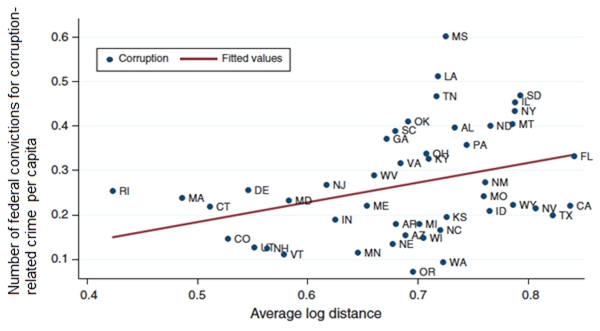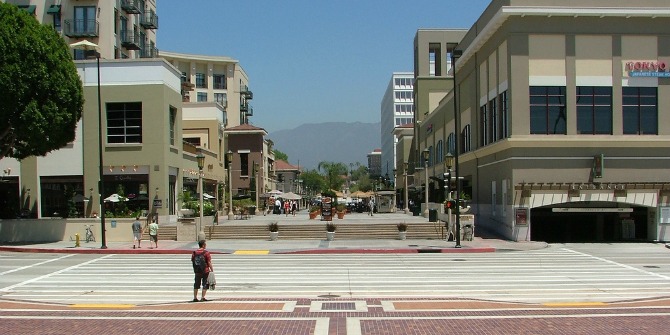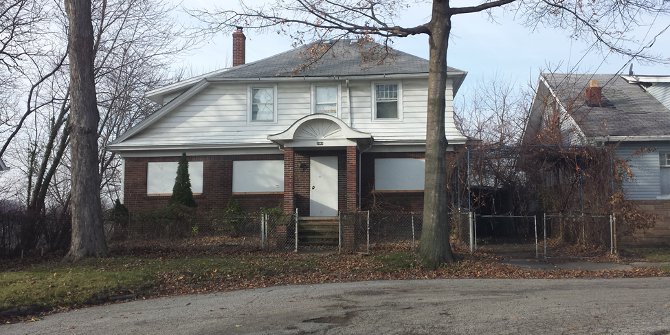 Albany, Sacramento, and Tallahassee – what do these state capitals have in common? They are all located some distance from the main population centres of their state. In new research, Filipe Campante finds that states with more isolated capitals such as these tend to be more corrupt, and spend less on public goods, and more on administrative expenditures instead. He argues that this corruption is fuelled by the fact that these cities’ tend to be covered far less in the media outside their locations, which in turn leads to substantially reduced public oversight.
Albany, Sacramento, and Tallahassee – what do these state capitals have in common? They are all located some distance from the main population centres of their state. In new research, Filipe Campante finds that states with more isolated capitals such as these tend to be more corrupt, and spend less on public goods, and more on administrative expenditures instead. He argues that this corruption is fuelled by the fact that these cities’ tend to be covered far less in the media outside their locations, which in turn leads to substantially reduced public oversight.
It will have struck many an American schoolchild, or most anyone getting acquainted with the political geography of US states, that in many of those states the government is located in an unexpected place. New York’s Albany, California’s Sacramento or Florida’s Tallahassee are hardly the first cities to come to mind when thinking of each of those states, and yet these are but a few examples of capital cities removed from a state’s main centers of population.
This may seem to be not much more than a good source for trivia questions, but in fact it has much more serious implications for the quality of governance. If we plot a standard measure of corruption in US states – namely, the number of federal convictions for corruption-related crime (relative to the size of the population) – against a measure of the degree of isolation of the state’s capital, as Figure 1 illustrates, we see a distinctive positive relationship: states with more isolated capitals are more corrupt.
Figure 1 – Corruption and Isolation of U.S. State Capitals

Source: Filipe Campante and Quoc-Anh Do
The importance of the location of the capital was recognized right from the start, back when state (and federal) capitals were being designated and located. Two concerns were very prominent in this process, and contributed to a general pattern of isolation. First, people like James Madison defended the idea that capitals should be centrally situated, as a matter of citizen representation. In addition, there was a widespread perception that political and economic power ought to be kept geographically separated: too much proximity to powerful economic interests would open the door for corruption.
The idea seems sensible at face value, but my research (with Professor Quoc-Anh Do) confirms what Figure 1 above had indicated: the idea of separating capitals appears to have backfired. States with more isolated capital cities are indeed ranked as more corrupt according to a number of different measures, and even accounting for other factors typically thought to influence the degree of corruption. What is more, using statistical techniques we actually find evidence of cause and effect: having a more isolated capital city seems to lead to more corruption.
But why would thatbe the case? It turns out that having an isolated capital city affects many of the most important sources of accountability that keep politicians in check.
Start with the media, and specifically newspapers. It turns out that outlets whose readers are closer to the capital tend to devote significantly more coverage to state politics and politicians. For instance, consider the case of New York. Over the last year, the Albany Times Union was more than twice as likely to mention the word “Cuomo” (the name of the state’s Governor) as was the New York Times, once the relative size of the two newspapers is taken into account. The difference is even starker when it comes to other state officials: Sheldon Silver, the longstanding Speaker of the State Assembly, was about five times as likely to be mentioned in the Times Union as in the Times.
In light of that, it is not surprising to find that people who live farther from the state capital are on average less knowledgeable and less interested in state politics. They are also less inclined to turn out to vote in state-level elections, or to contribute money to state-level campaigns. Put simply, citizens who are relatively disinterested and uninformed are less likely to engage with state politics, and this further weakens accountability.
This picture of less accountability also appears in a finding that would certainly disconcert the old proponents of the idea of isolating the capital as a bulwark against capture by powerful economic interests: states with more isolated capitals actually have more money in state politics, and that money comes disproportionately from those who are closer to the capital.
All of this seems to matter in very tangible ways. We find that states with isolated capitals tend to spend less, and less effectively, in the provision of public goods such as education, and to spend more on administrative expenditures instead. Politicians in isolated capitals seem to deliver less for the states that they run.
From this reasoning, it does not necessarily follow that the capital should be moved from Albany to New York City, or from Sacramento to Los Angeles. First, there are other important considerations guiding public policy beyond reducing corruption, and such a move could have other nasty consequences – to pick one, let’s just say that traffic in Manhattan is already pretty bad as it is.
In addition, many other factors affect how much corruption will prevail in a given place. Anyone familiar with the politics of Illinois or Pennsylvania will most likely agree that the infamously corrupt political culture of Chicago or Philadelphia is unlikely to prove the best environment to cleanse the stains left by the isolation of those states’ current capitals.
It is important to recognize, however, that politicians in isolated state capitals, like the proverbial mice paired with an oft-absent cat, need special vigilance. What is more, this is likely to continue to be the case for the foreseeable future, as rumors regarding the “death of distance” appear to be greatly exaggerated. It is true that nowadays it is possible to get news from the capital at the tip of one’s finger, from just about anywhere in the state – or the planet, for that matter. That notwithstanding, online media seem to display at least as much of a tendency to disregard what is far from their audience’s eyes – while the ongoing crisis of print media defangs the most traditional source of accountability over state-level politicians.
This article is based on the paper ‘Isolated Capital Cities, Accountability, and Corruption: Evidence from US States’, in the American Economic Review.
Featured image credit: Arthur Hanna (Flickr, BY-NC-SA-2.0)
Please read our comments policy before commenting.
Note: This article gives the views of the author, and not the position of USApp– American Politics and Policy, nor of the London School of Economics.
Shortened URL for this post: http://bit.ly/1qWZIEu
_________________________________
 Filipe R. Campante – Harvard Kennedy School
Filipe R. Campante – Harvard Kennedy School
Filipe R. Campante is Associate Professor of Public Policy at the Harvard Kennedy School. He is interested in political economy and economic development, with special emphasis on understanding the constraints that are faced by politicians and governments beyond elections and formal “checks and balances”. His research has been published in many leading academic journals, such as the American Economic Review, Review of Economics and Statistics, Journal of Public Economics, and Journal of the European Economic Association, as well as featured on media outlets such as the New York Times, The Economist, Wall Street Journal, Washington Post, and NPR.






